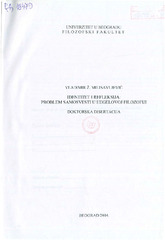Приказ основних података о дисертацији
Identitet i refleksija : problem samosvesti u Hegelovoj filozofiji
Identity and reflection: the problem of self-consciousness in Hegel's philosophy
| dc.contributor.advisor | Kučinar, Zdravko | |
| dc.contributor.other | Zurovac, Mirko | |
| dc.contributor.other | Kozomara, Mladen | |
| dc.creator | Milisavljević, Vladimir Ž. | |
| dc.date.accessioned | 2016-01-05T12:53:38Z | |
| dc.date.available | 2016-01-05T12:53:38Z | |
| dc.date.available | 2020-07-03T09:59:02Z | |
| dc.date.issued | 2005-03-29 | |
| dc.identifier.uri | http://eteze.bg.ac.rs/application/showtheses?thesesId=1151 | |
| dc.identifier.uri | https://nardus.mpn.gov.rs/handle/123456789/3295 | |
| dc.identifier.uri | https://fedorabg.bg.ac.rs/fedora/get/o:7961/bdef:Content/download | |
| dc.identifier.uri | http://vbs.rs/scripts/cobiss?command=DISPLAY&base=70036&RID=29404175 | |
| dc.description.abstract | Glavna teza ovog rada je da se Hegelova filozofija može shvatiti kao rešenje centralnog problema nemačkog idealizma, tj. kao odgovor na pitanje o strukturi samosvesne subjektivnosti. Dokaz ove teze najpre se izvodi kroz rekonstrukciju evolucije Hegelovog mišljenja. Hegel je u svojim ranim rukopisima razradio jedan pojam apsoluta koji ne leži s one strane podvajanja ili refleksije, već se može razumeti jedino kao princip jedinstva koji refleksiju već sadrži u sebi. Pri kraju svog jenskog perioda, Hegel je izložio metafizičku osnovu ovog gledišta u svojoj koncepciji o apsolutnoj negativnosti. Ta koncepcija dozvolila je Hegelu da razvije, u Fenomenologiji duha, teoriju o samosvesti kao kompleksnoj strukturi identiteta i razlike, i da je proširi na pojmove "duha" (ili intersubjektivnosti), "religije" i "apsolutnog znanja". Ipak, Hegel je konačni odgovor na pitanje o strukturi samosvesti dao tek u svojoj Nauci logike. Njegovo rešenje problema identiteta bića i znanja, koji je konstitutivan za samosvest, izloženo je na početku logike suštine. U tom poglavlju, Hegel određuje refleksiju koja "pretpostavlja" biće (voraussetzende Reflexion) kao intemi momenat refleksije koja "postavlja" biće na koje se odnosi i iz kojeg se ona "vraća" u sebe samu (setzende Reflexion). Osnovni operativni pojmovi "teorije samosvesti" - kakvi su identitet, razlika, protivrečnost ili osnov - mogu se takođe definisati kao konstitutivni momenti Hegelovog pojma refleksije. Nasuprot Fihteovom učenju o nauci, Hegelova filozofija može se opisati kao rezultat pokušaja da se problemi "teorije samosvesti kao refleksije" reše putem radikalizacije njenih osnovnih pretpostavki. | sr |
| dc.description.abstract | The principal thesis of this work is that Hegel’s philosophy can be understood as a solution to the central problem of German idealism, i.e. as an answer to the question of the structure of self-conscious subjectivity. First of all, a demonstration of this thesis is given through a reconstruction of the evolution of Hegel’s thought. In his early manuscripts, Hegel elaborated a concept of Absolute which does not simply lie beyond the domain of Entzweiung or reflection, but can be conceived only as a principle of unity that already contains reflection in itself. Toward the end of his "Jena period", Hegel provided a metaphysical foundation for this view in his conception of absolute negativity. This conception allowed Hegel to develop, in his Phenomenology of Spirit, a theory of self-consciousness as a complex structure of identity and difference, and to expand it to the concepts of "spirit" (or intersubjectivity), "religion" and "absolute knowledge". Nevertheless, Hegel did not give his final answer to the question of the structure of self- consciousness until the publication of his Science of Logic. Hegel’s solution to the problem of identity of being and knowledge, which is constitutive of self-consciousness, is exposed at the beginning of the logic of essence. In this chapter, Hegel defines the reflection that "presupposes" being (voraussetzende Reflexion) as internal to the reflection that "posits" being to which it refers and from which it "comes back" to itself (setzende Reflexion). The fundamental operative concepts of a "theory of self-consciousness" - identity, difference, contradiction or ground - can also be defined as constituents of Hegel’s comprehensive concept of reflection. Contrarily to Fichte's Doctrine of science, Hegels philosophy can be described as a result of the attempt to solve the problems of the "theory of self-consciousness as reflection" by means of a more radical interpretation of its basic presuppositions. | en |
| dc.format | application/pdf | |
| dc.language | sr | |
| dc.publisher | Универзитет у Београду, Филозофски факултет | sr |
| dc.rights | openAccess | en |
| dc.rights.uri | https://creativecommons.org/licenses/by-nc-nd/4.0/ | |
| dc.source | Универзитет у Београду | sr |
| dc.subject | Hegel | sr |
| dc.subject | Hegel | en |
| dc.subject | Georg Wilhelm Friedrich (1770-1831) | en |
| dc.subject | identity | en |
| dc.subject | reflection | en |
| dc.subject | self-consciousness | en |
| dc.subject | antinomy | en |
| dc.subject | absolute | en |
| dc.subject | spirit | en |
| dc.subject | identity | en |
| dc.subject | negativity | en |
| dc.subject | difference | en |
| dc.subject | Georg Wilhelm Friedrich (1770-1831) | sr |
| dc.subject | identitet | sr |
| dc.subject | refleksija | sr |
| dc.subject | samosvest | sr |
| dc.subject | antinomija | sr |
| dc.subject | apsolut | sr |
| dc.subject | duh | sr |
| dc.subject | identitet | sr |
| dc.subject | negacija | sr |
| dc.subject | razlika | sr |
| dc.title | Identitet i refleksija : problem samosvesti u Hegelovoj filozofiji | sr |
| dc.title | Identity and reflection: the problem of self-consciousness in Hegel's philosophy | en |
| dc.type | doctoralThesis | en |
| dc.rights.license | BY-NC-ND | |
| dcterms.abstract | Кучинар, Здравко; Козомара, Младен; Зуровац, Мирко; Милисављевић, Владимир Ж.; Идентитет и рефлексија : проблем самосвести у Хегеловој филозофији; Идентитет и рефлексија : проблем самосвести у Хегеловој филозофији; | |
| dc.identifier.fulltext | https://nardus.mpn.gov.rs/bitstream/id/26562/Disertacija.pdf | |
| dc.identifier.fulltext | http://nardus.mpn.gov.rs/bitstream/id/26562/Disertacija.pdf | |
| dc.identifier.rcub | https://hdl.handle.net/21.15107/rcub_nardus_3295 |


